.jpeg?width=726&height=667&name=shutterstock_1756838960%20(1).jpeg)
Nutritional Support for Skin and Coat
Many pet parents associate a shiny coat with grooming or bath routines—but nutrition plays a big role too. Your dog or cat’s skin and fur reflect their internal health, especially their intake of essential fatty acids, vitamins, and minerals.
If your pet suffers from dryness, excessive shedding, or dull fur, they may be lacking key nutrients.
Understanding Omega-3 Fatty Acids
Omega-3s are a group of essential fatty acids that animals (and humans) must obtain from their diet. The most important ones for pets are:
- EPA (Eicosapentaenoic Acid): Supports skin structure and reduces inflammation
- DHA (Docosahexaenoic Acid): Promotes cell membrane health and plays a role in the immune response
These fatty acids are commonly found in:
- Cold-water fish (like salmon and sardines)
- Algae oil (a plant-based alternative)
How Omega-3 Supports Skin and Coat Health
1. Reduces Skin Inflammation
Omega-3s help regulate the immune system and reduce inflammatory responses in the skin.
2. Improves Coat Texture and Shine
Fatty acids help nourish hair follicles from the inside, resulting in softer, shinier, and more resilient fur.
3. Supports Skin Hydration
Omega-3s enhance the skin’s natural barrier, reducing water loss and preventing dryness or flakiness.
4. May Reduce Excessive Shedding
By strengthening the skin and improving follicle health, supplements may help reduce non-seasonal shedding and patchiness.
Other Key Nutrients for Skin and Coat Health
- Zinc: Important for skin repair and reducing irritation
- Biotin (Vitamin B7): Helps with keratin production, improving fur texture
- Vitamin E: An antioxidant that protects skin cells from oxidative stress
- Vitamin A: Supports skin cell turnover and oil gland function
Which Pets Might Benefit Most from Supplements?
- Pets with dull or thinning fur
- Dogs or cats with flaky or itchy skin
- Animals with diagnosed allergies or sensitivities
- Pets on limited or processed diets
- Breeds predisposed to skin conditions (e.g., Westies, Bulldogs, Persians)
What to Expect After Supplementing
Most pet parents notice improvements in:- Skin comfort and reduced scratching (within 2–4 weeks)
- Coat shine and texture (within 4–6 weeks)
- Decrease in shedding or hair breakage
Consistency is key. Like all nutritional changes, it takes time for benefits to become visible.
-

Thinning of the coat could indicate poor diet
Can Diet Alone Provide Enough Omega-3?
Most commercial pet foods contain Omega-6 in abundance but may lack sufficient Omega-3—especially if they’re heat-processed, as Omega-3s degrade quickly. Supplementation can help balance the Omega-6 to Omega-3 ratio, which is crucial for managing inflammation and supporting skin health.
Tips for Supporting Your Pet’s Skin Naturally
- Provide a complete, balanced diet
- Use a high-quality Omega-3 supplement if recommended
- Regular grooming to remove dead hair and stimulate skin oils
- Keep up with flea and parasite control
- Monitor for signs of allergies and consult your vet early
Your pet's skin is their largest organ—and their coat is their first line of defense. Supporting it through proper nutrition, especially with Omega-3 and essential micronutrients, is one of the most effective ways to promote long-term comfort and vitality.